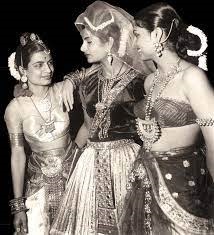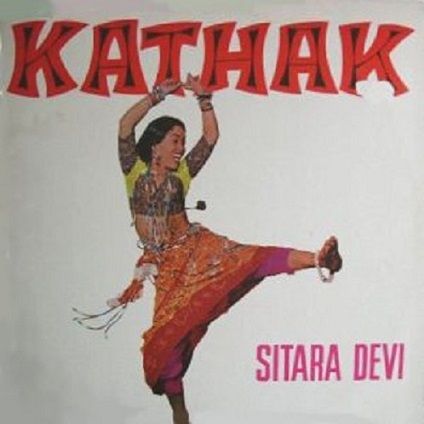
A few years ago, thanks to the efforts of two Facebook and blogging friends, I had the pleasure of receiving a free copy of the book My Name Is Gauhar Jaan! by Vikram Sampath. I received this book from Karen Joan Kohoutek (of the blog October), who sent me an extra copy of it after asking for a suggestion of whom to send it to in a conversation with Suzy AKA Sitaji (who should be familiar to many longtime readers here.) It was great, indeed, to have this thick biography about India’s first recording star. But I must have been very busy or distracted at the time, because I really only skimmed it and probably not cover-to-cover, either. But this past month, I decided to read it again, a few days after learning (on June 26) that people were observing Gauhar Jaan’s birthday. And as I started to read it, I realized that it connected in a lot of ways to a few books – and general subjects – that I had just recently read and blogged about.
For instance, after writing a bit about Wajid Ali Shah (as well as reading and writing about his famous wife), it was very interesting to read that Gauhar Jaan had started on her path to becoming a famous singer by singing (along with her mother) in Wajid Ali Shah’s court in Calcutta. Sampath also took the time to write a very informative chapter about the thumri, the musical form that specifically is connected to both Wajid Ali Shah (whose artistic reign was known for the growth of thumri and, especially, Kathak) and Gauhar Jaan (because it is a form of music that she became very well known for, too).
My Name Is Gauhar Jaan! also contains a good amount of information about the fate of the tawaifs in this era. Sampath writes a lot about the anti-Nautch campaigns that eventually contributed to Gauhar Jaan’s demise, but he also describes how Gauhar Jaan became the first among many tawaifs who transcended the limitations of the tawaif culture (which was due to decline in any event) when she became the first star of India to transfer her talents onto records. (By the way, contrary to what many people say, she was not the first Indian singer to have performances recorded – a fact that becomes evident in the book and which is also very well documented in an article by Surjit Singh. But she was, indeed, India’s first recording star.)
Apparently, in a great way, Gauhar Jaan was a true pioneer. But there was another, far less positive way in which she was also a sort of prototype.
The bad/sad side of Gauhar Jaan’s story looked very familiar to me as I read about it, because it had a lot in common with some other stories that I had read about (and wrote about in other blog posts). That is because, in addition to being a bit of a rag-to-riches story at the beginning of her career, she was even more a riches-to-rags story at the end.
The story of Gauhar Jaan’s decline, impoverishment, and sad demise reminded me a bit of the story of Zarina Begum, a protégé of Begum Akhtar (who actually had, herself, been known to be well influenced by Gauhar Jaan). Since I have written about Zarina twice before in this blog (and also turned those blog posts into an article that was published in the journal The World of Apu), it was natural that Zarina’s story was one of the first that came to my mind. But there was an aspect of Gauhar Jaan’s decline that was more reminiscent of at least one of the artists whom I mentioned in my post Here’s to the Birth or Death Anniversaries of Three Classic Hindi Film Artists Who Certainly Should Not Have Died In Poverty. If you read the comments below that post, you’ll see an astute one by AK (blogger at Songs of Yore) pointing out that at least some fallen Indian film artists contributed to their own demise with their “excesses in lifestyle” (that is, the reckless and ostentatious lifestyles that they indulged in), with “total lack of concern for savings for future” (probably because they never considered that the good days might end). And at that point, I pointed out that the fallen artist in my post who most fit that description was the great pioneering film cabaret dancer, our beloved Cuckoo Moray.
Unfortunately, due to limitations of time, space, etc., I have decided that I cannot get (back) into the specific tales of those later fallen artists here (unless you would like me to take another six weeks to put up a post). But with a little investigation, I’m sure that most readers will be able to find a few such stories. Since I mentioned Cuckoo, I would like to recommend the sad story to be found at Cineplot, and also to look at Wikipedia and other sources. You will, indeed, find some uncommon parallels. Meanwhile, let’s get back to our poor departed Gauhar . . .
While at her peak, Gauhar Jaan became notorious for the lavish way she traveled (very fancy stagecoaches, etc.), her elaborate, mostly paid entourage, and her heaps of highly authentic jewelry, she was overwhelmed with debt by the end of her life, when she died in a “desolate corner” (as Sampath describes it) of a hospital in Mysore after suffering from a fever resulting from an unspecified ailment. Though once surrounded by hordes of admirers, there was no one around to keep her company on her deathbed, and apparently, no one is sure exactly where she was buried, and she might have just been left in an unmarked grave. (Had there been resources set aside for the purpose, her body might have received an appropriate burial in Calcutta.)
And in future years, Sampath tells us, Gauhar Jaan’s legacy was nearly forgotten, as other musical stars – on records and then in films – claimed all the attention of audiences throughout the rest of the 20th century. But as with some of those other fallen stars of the 20th century, there seems to have been some revival of her legacy in the past couple of decades. That’s why Google issued a Gauhar Jaan “Doodle” for her birthday. (Unfortunately, I live in the U.S., where so many of these Google Doodles related to Indian music and films are never posted. Nonetheless, it usually is still pretty easy for me to find out about them and see them.) There have been re-releases of Gauhar Jaan’s work in recent times, and we can even find 114-year-old recordings of her in audio clips on YouTube (such as the great one that I have included below). Obviously, this revival has been somewhat facilitated by new technologies that brought global access to Gauhar Jaan’s recordings so that people like yours truly could hear her voice with the click of a button while sitting in an apartment in 21st Century New York City, USA.
At the end of his biography, Sampath speculates that Gauhar Jaan’s ruined emotional state – due to the decline of her career and her finances – might have been a major contributor to her death. As with some others among that not-small number of stars who sadly followed in Gauhar Jaan’s footsteps via their own decline and descent into obscurity, at the sad end to her tale, we are left thinking, if only she could have known that her reputation would be at least somewhat revived many years later. But there are many things that Gauhar Jaan could never have predicted, including the fact that her voice would be heard via technology that far surpassed the once seemingly miraculous sound recordings in which she had played the part of India’s greatest singing pioneer.




I doubt if I’ll ever get around to reading this book, Richard, but thank you for a very interesting article. This was enlightening, and – as a bit of an aside – I agree, too, with AK’s comment about some of these stars having probably brought about their tragic ends by in the first place never thinking about saving for the future. There are sad stories of riches-to-rags aplenty, and somehow I find it impossible to believe that people who were once very successful and commanded massive salaries (or fees) couldn’t have saved up enough to keep them going once their careers – inevitably – would end. There are of course some who’ve been truly unlucky, but many, I think, were at least partly responsible for ending up so poor and helpless.
Madhu,
I would strongly recommend this book because it talks not only about Gauhar Jan, but also a good deal about tawaif culture. In popular imagination they were associated with brothels, but once upon a time they were supposed to be carriers of high art and ‘tahzeeb’ to whom zamindars used to send their wards for grooming in fine arts and good manners, a kind of finishing school.
Gauhar Jan’s misery was not so much on account of reckless living, as getting married to a rogue and an obnoxious person, who cheated her of her entire assets. She spent her last years fighting court battles to retrieve her property. In this respect her story mirrors many women celebrities who were not able to get out of a bad marriage.
Vinkram Sampath is an interesting guy. A BITS Pilani alumnus, MBA, Corporate job in Finance, and leaving all that to become a practising musician (Carnatic music), writer and archivist, is quite impressive. He has also written a very highly acclaimed biography of the Veena Man, S Balachander, and another one on Mysore Royals.
AK
First of all, to Madhu, thank you for the good words again. And I hope you do eventually read this book (which both I and AK would recommend), although I understand that first you would want to get through that 400+-page novel about Begum Hazrat Mahal. ;)
Regarding your thoughts concurring with the comment from AK that I referred to from before and your comment, “There are of course some who’ve been truly unlucky, but many, I think, were at least partly responsible for ending up so poor and helpless,” I do think Gauhar Jaan was a little of both.
AK, it is interesting to see you take up a sort of opposite perspective here. :) But there are parts of this book in which Sampath describes in detail Gauhar Jaan’s ostentatious ways of traveling, performing, and living in general, when she was at her peak. He seems to do so in a positive way, saying that she did not care what other people thought of all of it, because she was determined to be “herself.” But on the other hand, it is not unreasonable to assume that she might have been able to set aside something for the eventuality of hard luck had she not spent so much to maintain that image. Then when she was hit with all the legal troubles and the cheating out of money by the obnoxious man she married (who was not the only man who screwed her over in the tale related by this book), don’t you think it is possible that she might have had some other resources that she could have drawn upon, had she lived her life a slightly different way?
When you commented about stars not saving sufficiently for the eventuality of bad times, I though that could apply, also, to not doing something sufficient in order to persevere in the event of bad luck. I don’t think the husband robbed her of everything, nor did the other legal battles, but all of it together was too much for her, and it all hit her when – and to some extent because – she was on the way down. This is not to say that I would have blamed her, but nor would I have blamed other fallen stars whom I couldn’t help comparing her too. Ultimately, I think it’s the responsibility of the society to ensure that when someone declines professionally and/or financially (as well as in terms of health), that person is not left to suffer brutal circumstances that lead to a horrible end.
Then there is the matter that she came to depend too much on the adulation of others without ever achieving some kind of internal peace and satisfaction with herself. I think Sampath makes that point pretty clear.
Regarding your statement about Sampath that “A BITS Pilani alumnus, MBA, Corporate job in Finance, and leaving all that to become a practising musician (Carnatic music), writer and archivist, is quite impressive”. . . Another way one might look at that is that he wanted to make sure he could secure a lucrative profession and build up his finances before taking the risks to become the things that he probably really wanted to be, such as a Carnatic musician, writer, and archivist. :)
Thanks, AK and Richard. :-) Vikram Sampath was friends with me on Facebook, so I do know a little bit about him.
By the way, have either of you read Ruth Vanita’s Dancing with the Nation: Courtesans in Bombay Cinema?
Richard,
In Gauhar Jaan’s case my reading is that she could afford her lifestyle. I have a very strong recollection from the book that once she owned a significant part of Calcutta real estate, and later she realised that her husband had got her to sign some papers which left her nothing. That was crockery. You rightly observe that she never had inner peace. I think that was the universal tragedy of courtesans – yearning for ‘respectability’, moving from a ‘Bai’ to ‘Begum’. Some never achieved that, some were conned by horrible men. May be Gauhar Jaan was too naive and unlettered to handle that part of her life. Not everybody could be a Sitara Devi.
The way you put Vikram’s choices minimises his switch over. I think it didn’t happen in a planned manner.
AK
Madhu,
I have not read ‘Dancing with the Nation: Courtesans in Bombay Cinema’, but now that you mention it I would look it up. Though I should say I am now reading a book co-authored by her on same sex love in literature and mythology, and I find her conclusions, suggestions too sweeping. Mentioning Krishna-Arjun, Karna-Duryodhan in that context seems too far-fetched, or I am too illiterate.
AK
Madhu, I have not read Ruth Vanita’s Dancing with the Nation: Courtesans in Bombay Cinema, but I looked it up and it looks like something I would like to read. I will look around to see if I can find it here in the U.S. It would be particularly nice if it turned up in the library!
AK, re. your comment that “she could afford her lifestyle,” I’m not sure what that means. If she could, then many of these stars who indulged in lavish, ostentatious lifestyles at their peak could as well. So could Cuckoo Moray, etc. You had commented on these other stars that they did not save up for the future, but one could argue that they certainly could afford the lifestyles that they indulged in at the time they did the indulging. : )
Gauhar Jaan’s career declined – especially the demand for her live performances. Some of this was due to her getting older and suffering the decline in social appeal that many performing artists (especially women) who made it big when they were young go through as they age. But a lot of it had to do with the anti-Nautch movement and new wave of morality in the 20th century (which came from the British but which was also adopted by many Indians), which destroyed the lives of so many tawaifs. Sampath goes into this quite a bit. Gauhar Jaan could have replenished what she lost in the bad marriage had she not undergone a sharp decline in her career as well. That is what I gathered from the book, at any rate.
Regarding Mr. Sampath, himself . . . I did not mean to imply that the change that he underwent in his life had to be the result of a careful plan. But some people are socially oriented to do everything that they can to have a lucrative occupation even though they could have been more involved in writing or the arts, etc., from the start, because pursuing the lucrative occupation is the sensible thing to do. Then, when they feel that they have some financial security, they get more into doing the things that they really would rather do. I don’t see it as a matter of his simply, heroically “giving up” one way of life to pursue the less lucrative or more risky endeavors. But, of course, I don’t know him, so I have no idea what really went through his mind.
I am certainly not blaming him for taking the more boring and lucrative path at first. I often wish that I had more of that orientation, myself, decades ago. :)
AK: “Mentioning Krishna-Arjun, Karna-Duryodhan in that context seems too far-fetched, or I am too illiterate.” Heheh! If that’s the case, then I’m illiterate too. I agree that that sounds very far-fetched. But I’ve been reading excerpts of this book on courtesans in Hindi cinema (mostly since it’s been published by my publisher, Speaking Tiger) which was why I was intrigued.
Richard: “I am certainly not blaming him for taking the more boring and lucrative path at first. I often wish that I had more of that orientation, myself, decades ago. :)” Oh, absolutely not holding the taking of the ‘boring and lucrative path’ against him. One has to survive, and writing, as I know you know too, is definitely not the most reliable way of making a living! But I’ll write to you separately and tell you. :-)